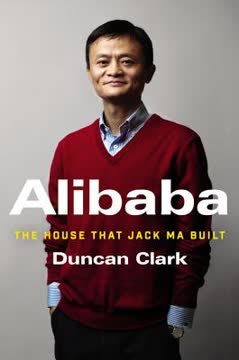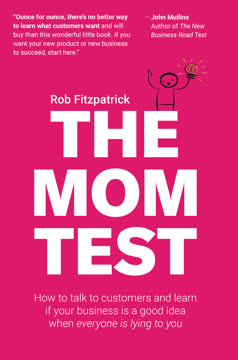Key Takeaways
1. Founding dilemmas shape startup trajectories and outcomes
It's unfortunate but true: If entrepreneurship is a battle, most casualties stem from friendly fire or self-inflicted wounds.
Early decisions matter. Founders face a series of critical choices from the outset that can make or break their ventures. These include whether to start solo or with cofounders, how to structure the founding team, and when to bring in outside resources. Each decision involves trade-offs that can have long-lasting consequences.
Anticipate challenges. Successful entrepreneurs think ahead about potential pitfalls and plan accordingly. This includes:
- Considering the impact of relationship choices on team dynamics
- Structuring equity agreements to align incentives and allow for changes
- Carefully evaluating investor fit beyond just capital
Balance passion with planning. While entrepreneurial passion is essential, it can lead to overconfidence and poor decision-making. Founders should temper their optimism with careful analysis and seek outside perspectives to avoid common pitfalls.
2. Career timing impacts entrepreneurial success and preparedness
There's no perfect time to become a founder, should I become an entrepreneur?
Assess readiness. Before launching a venture, potential founders should evaluate their:
- Human capital: Skills, knowledge, and experience relevant to the venture
- Social capital: Network of relationships and industry connections
- Financial capital: Personal savings and ability to bootstrap
Consider life stage. The decision to start a company is influenced by personal circumstances:
- Early-career founders may have more flexibility but less experience
- Mid-career founders often have valuable skills and networks, but face higher opportunity costs
- Late-career founders bring extensive experience but may struggle with the demands of a startup
Timing matters. Market conditions, technological trends, and personal readiness all play a role in determining the right time to launch. Waiting too long can lead to missed opportunities, while moving too soon without adequate preparation increases the risk of failure.
3. Founding teams face critical relationship, role, and reward decisions
There are more critical decisions—and more options within each decision—than many founders realize.
Team composition is crucial. Founders must carefully consider:
- Prior relationships: Friends, family, colleagues, or strangers
- Complementary skills: Balancing technical and business expertise
- Shared values and vision: Alignment on goals and work styles
Roles and responsibilities. Clear division of labor and decision-making processes are essential:
- Formal titles: CEO, CTO, etc.
- Functional responsibilities: Who leads which areas of the business
- Decision-making authority: Consensus vs. hierarchy
Equity allocation. How founders split ownership has long-lasting implications:
- Static vs. dynamic splits: Building in flexibility for changing contributions
- Vesting schedules: Incentivizing long-term commitment
- Consideration of past, present, and future contributions
4. Hiring choices significantly influence startup growth and culture
Do we hire him as a manager or as a VP reporting to the CEO? Early in the company's life, you don't have the ability to give them more salary, but titles are cheap to give out so you use that to make the package more attractive.
Strategic hiring. Early employees shape company culture and capabilities:
- Generalists vs. specialists: Balancing flexibility with expertise
- Experience level: Weighing cost against skill and industry knowledge
- Cultural fit: Maintaining cohesion while promoting diversity
Compensation structures. Startups must creatively attract talent:
- Equity vs. salary trade-offs
- Performance-based incentives
- Non-financial motivators (mission, growth opportunities)
Scaling challenges. As startups grow, hiring needs evolve:
- Transitioning from generalists to functional experts
- Professionalizing HR practices and organizational structure
- Managing the integration of new hires with founding team members
5. Investor selection affects both resource access and founder control
The more critical a resource is to a startup, the more the startup must give up to attract it.
Funding options. Entrepreneurs have various capital sources, each with trade-offs:
- Bootstrapping: Maintaining control but limiting growth
- Friends and family: Easy access but potential relationship strain
- Angel investors: Industry expertise but less capital
- Venture capital: Significant resources but loss of control
Investor fit. Beyond capital, founders should consider:
- Strategic value: Industry connections and expertise
- Alignment: Shared vision for company growth and exit strategy
- Reputation: Track record of working with entrepreneurs
Control implications. Taking outside investment often means:
- Board seats: Changing decision-making dynamics
- Liquidation preferences: Impacting potential returns
- Pressure for growth: Potentially conflicting with founder preferences
6. Founder-CEO succession is a pivotal moment for startups
You can replace a CEO, but you can't replace a founder.
Triggers for change. CEO transitions often result from:
- Company growth outpacing founder skills
- Investor pressure for experienced leadership
- Founder burnout or desire for new challenges
Managing the transition. Successful successions require:
- Clear communication with stakeholders
- Defining ongoing roles for founding team members
- Careful selection of new leadership aligned with company needs
Founder's dilemma. Many entrepreneurs struggle with:
- Emotional attachment to their "baby"
- Recognizing their own limitations
- Balancing personal goals with company needs
7. Wealth vs. control trade-offs define entrepreneurial paths
There is an inherent tension between achieving one and the other.
Fundamental choice. Entrepreneurs must decide whether to prioritize:
- Wealth: Maximizing financial returns, often by ceding control
- Control: Maintaining decision-making power, potentially limiting growth
Decision impacts. This core motivation influences choices throughout the startup journey:
- Team building: Solo founding vs. attracting top talent
- Financing: Self-funding vs. taking outside investment
- Growth strategy: Slow and steady vs. rapid scaling
Hybrid approaches. Some founders attempt to balance both objectives:
- Maintaining control in early stages, then bringing in outside resources
- Focusing on niche markets with less competition
- Leveraging alternative growth strategies (e.g., franchising)
Last updated:
FAQ
What's The Founder's Dilemmas about?
- Focus on Founding Challenges: The Founder's Dilemmas by Noam Wasserman examines the internal challenges founders face, particularly "people problems" that can lead to startup failure.
- Founding Dilemmas Framework: It introduces a framework of "founding dilemmas," covering career decisions, team dynamics, and the balance between wealth and control.
- Real-World Case Studies: The book uses a dataset of nearly 10,000 founders and case studies, including entrepreneurs like Evan Williams, to illustrate startup complexities.
Why should I read The Founder's Dilemmas?
- Practical Insights for Founders: The book offers actionable insights and frameworks to help entrepreneurs navigate common startup pitfalls.
- Research-Backed Analysis: It combines rigorous research with real-world examples, making it a valuable resource for understanding startup dynamics.
- Avoiding Common Mistakes: By highlighting internal challenges, it aims to help founders make informed decisions for greater success.
What are the key takeaways of The Founder's Dilemmas?
- Team Dynamics Importance: Founders must carefully consider their founding teams, as relationships and roles significantly impact success.
- Wealth vs. Control Trade-offs: Founders face dilemmas between maximizing wealth and maintaining control, affecting long-term outcomes.
- Pre-Founding Considerations: Potential founders should evaluate career, personal, and market circumstances before starting a business.
What are the main dilemmas discussed in The Founder's Dilemmas?
- Career Dilemmas: Founders must decide when to launch their startup based on personal, career, and market factors.
- Founding Team Dilemmas: This includes decisions on solo versus team founding, relationship dynamics, role assignments, and equity splits.
- Hiring and Investor Dilemmas: Challenges include hiring the right team and attracting investors while balancing risks and rewards.
How does Noam Wasserman define "founding dilemmas"?
- Predictable Challenges: Founding dilemmas are common, predictable challenges that arise as startups grow, often leading to internal conflicts.
- Trade-offs: These dilemmas require founders to negotiate trade-offs, such as between wealth and control, with long-term implications.
- Focus on People Problems: Many startup failures stem from internal team issues rather than external market factors.
What is the "Three Rs" framework in The Founder's Dilemmas?
- Relationships, Roles, Rewards: The framework refers to critical areas founders must navigate: cofounder relationships, roles, and rewards (equity and compensation).
- Interconnectedness: Decisions in one area can impact others, making alignment across all three dimensions essential.
- Stability and Success: Proper alignment of the Three Rs can lead to greater team stability and increased chances of success.
How does The Founder's Dilemmas suggest managing team dynamics?
- Proactive Communication: Founders should establish open communication to address potential conflicts and ensure team members feel valued.
- Clear Role Definitions: Clearly defining roles and responsibilities can prevent overlap and reduce tensions within the team.
- Regular Check-ins: Regular discussions about team dynamics and contributions help maintain alignment and address emerging issues.
What are the risks of founding with friends or family according to The Founder's Dilemmas?
- High Emotional Stakes: Founding with friends or family can lead to emotional risks, as business conflicts may affect personal relationships.
- Avoiding Difficult Conversations: Founders may avoid critical discussions to protect personal relationships, leading to unresolved tensions.
- Statistical Instability: Teams with prior social relationships are less stable than those with professional relationships, increasing cofounder turnover.
How does The Founder's Dilemmas address equity splits?
- Equity Split Dynamics: Equity splits can lead to tension if not handled properly, with prior relationships impacting equitable splits.
- Equal vs. Unequal Splits: Teams often prefer equal splits to avoid conflict, but this can lead to dissatisfaction if contributions differ.
- Recommendations for Founders: Thoughtful negotiations considering past contributions and future expectations create a fair structure.
What strategies does The Founder's Dilemmas suggest for effective succession planning?
- Early Preparation: Founders should start thinking about succession early to mitigate resistance and ensure a smooth transition.
- Choosing the Right Successor: Selecting a successor with complementary skills and experience helps navigate growth challenges.
- Facilitating Transition: Clear roles and responsibilities during the transition reduce confusion and conflict, with the outgoing founder in a supportive role.
What role does social capital play in The Founder's Dilemmas?
- Definition of Social Capital: Social capital refers to networks and relationships that founders leverage for resources and support.
- Influence on Opportunities: Strong social capital can open doors to funding, partnerships, and talent acquisition.
- Building Social Capital: Founders are encouraged to cultivate networks and seek diverse connections to attract resources and support.
What are the best quotes from The Founder's Dilemmas and what do they mean?
- “The juice isn’t worth the squeeze.”: Reflects the idea that aggressive negotiations may not be worth the resulting tensions within the team.
- “You’re mixing friendship with business.”: Highlights risks of hiring friends, as personal relationships can complicate professional decisions.
- “Money buys time.”: Underscores the role of financial capital in allowing startups to experiment, pivot, and grow, emphasizing the need for adequate funding.
Review Summary
The Founder's Dilemmas is highly praised for its data-driven insights into startup challenges. Readers appreciate Wasserman's analysis of key decisions founders face, including co-founder selection, equity splits, and investor relationships. The book's focus on the wealth vs. control tradeoff resonates with many. While some find it dated or obvious, most consider it essential reading for aspiring entrepreneurs. Critics note its length and academic style but acknowledge its value in highlighting potential pitfalls. Overall, reviewers recommend it as a comprehensive guide to navigating the complexities of founding a startup.
Similar Books










Download PDF
Download EPUB
.epub digital book format is ideal for reading ebooks on phones, tablets, and e-readers.




